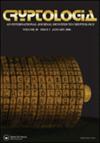How we set new world records in breaking Playfair ciphertexts
IF 0.4
4区 工程技术
Q4 COMPUTER SCIENCE, THEORY & METHODS
引用次数: 1
Abstract
Abstract The Playfair cipher is a well-known manual encryption method developed in the 19th century. Until 2018, known cryptanalysis techniques, with computer assistance, could solve non-keyword-based Playfair ciphertexts if they had at least 60 letters to work with. Shorter ciphertexts were effectively impossible to solve in the absence of a crib. In this article, we show how we introduced several improvements in these cryptanalysis methods, which made it possible to do much better. This resulted in the (unofficial) world record for the shortest Playfair message broken going down from 60 via 50, 40, 32, and 28 to 26 letters. The cryptanalysis techniques used include hill climbing, simulated annealing, tabu search, and plaintext-based dictionary attacks. For readers interested in improving the current record, we also provide unsolved Playfair challenges consisting of 24 and 22 letters.我们是如何在破解游戏密文方面创造新的世界纪录的
摘要Playfair密码是19世纪发展起来的一种著名的手动加密方法。直到2018年,已知的密码分析技术在计算机辅助下,如果有至少60个字母可供使用,就可以解决非基于关键字的Playfair密文。在没有婴儿床的情况下,较短的密文实际上是不可能解决的。在这篇文章中,我们展示了我们是如何在这些密码分析方法中引入一些改进的,这些改进使我们有可能做得更好。这导致Playfair最短信息的(非官方)世界纪录从60个字母减少到50个、40个、32个和28个,减少到26个。使用的密码分析技术包括爬山、模拟退火、禁忌搜索和基于明文的字典攻击。对于有兴趣改进当前记录的读者,我们还提供了由24封和22封信件组成的未解决的Playfair挑战。
本文章由计算机程序翻译,如有差异,请以英文原文为准。
求助全文
约1分钟内获得全文
求助全文
来源期刊

Cryptologia
工程技术-计算机:理论方法
自引率
33.30%
发文量
31
审稿时长
24 months
期刊介绍:
Cryptologia is the only scholarly journal in the world dealing with the history, the technology, and the effect of the most important form of intelligence in the world today - communications intelligence. It fosters the study of all aspects of cryptology -- technical as well as historical and cultural. The journal"s articles have broken many new paths in intelligence history. They have told for the first time how a special agency prepared information from codebreaking for President Roosevelt, have described the ciphers of Lewis Carroll, revealed details of Hermann Goering"s wiretapping agency, published memoirs - written for it -- of some World War II American codebreakers, disclosed how American codebreaking affected the structure of the United Nations.
 求助内容:
求助内容: 应助结果提醒方式:
应助结果提醒方式:


